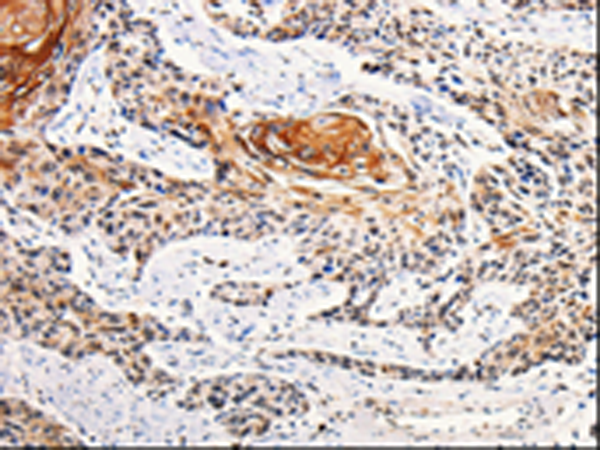
| WB | 咨询技术 | Human,Mouse,Rat |
| IF | 咨询技术 | Human,Mouse,Rat |
| IHC | 1/25-1/100 | Human,Mouse,Rat |
| ICC | 技术咨询 | Human,Mouse,Rat |
| FCM | 咨询技术 | Human,Mouse,Rat |
| Elisa | 1/2000-1/5000 | Human,Mouse,Rat |
| Aliases | NL2, ARP4, FIAF, PGAR, HFARP, pp1158, ANGPTL2 |
| Host/Isotype | Rabbit IgG |
| Antibody Type | Primary antibody |
| Storage | Store at 4°C short term. Aliquot and store at -20°C long term. Avoid freeze/thaw cycles. |
| Species Reactivity | Human |
| Immunogen | Fusion protein of human ANGPTL4 |
| Formulation | Purified antibody in PBS with 0.05% sodium azide and 50% glycerol. |
+ +
以下是关于ANGPTL4抗体的3篇参考文献及其简要摘要:
1. **文献名称**: *ANGPTL4 modulates vascular junction integrity by integrin signaling*
**作者**: Hato T, et al.
**摘要**: 该研究探讨了ANGPTL4在肿瘤转移中的作用,发现其抗体可抑制肿瘤细胞穿透血管内皮,通过调节整合素信号通路减少转移扩散。
2. **文献名称**: *Antibody-mediated neutralization of ANGPTL4 improves glucose metabolism and attenuates adipose tissue inflammation*
**作者**: Dewpura T, et al.
**摘要**: 研究显示,中和性ANGPTL4抗体可抑制其与脂蛋白脂肪酶(LPL)结合,改善高脂饮食小鼠的脂代谢异常,并减轻脂肪组织炎症。
3. **文献名称**: *Monoclonal antibody targeting ANGPTL4 ameliorates obesity-associated insulin resistance*
**作者**: Xu A, et al.
**摘要**: 开发了一种靶向ANGPTL4的单克隆抗体,实验证明其能阻断ANGPTL4对LPL的抑制,恢复脂肪分解能力,显著改善肥胖小鼠的胰岛素敏感性。
注:以上内容为示例性概括,具体研究细节需参考原文。若需实际文献,建议通过PubMed或Google Scholar以“ANGPTL4 antibody”为关键词检索近年论文。
ANGPTL4 (Angiopoietin-like 4) is a secreted glycoprotein belonging to the angiopoietin-like family, primarily involved in regulating lipid metabolism, angiogenesis, and inflammation. It modulates lipoprotein lipase (LPL) activity, influencing triglyceride breakdown and energy distribution. Dysregulation of ANGPTL4 is linked to metabolic disorders, cardiovascular diseases, and cancer progression, making it a target for therapeutic and diagnostic research.
ANGPTL4 antibodies are immunological tools designed to detect, quantify, or inhibit the protein’s function. They are widely used in studies exploring metabolic pathways, tumor microenvironment interactions, or vascular biology. Polyclonal and monoclonal antibodies against ANGPTL4 enable applications like Western blotting, immunohistochemistry, ELISA, and flow cytometry. Some therapeutic antibodies aim to neutralize ANGPTL4 to treat hypertriglyceridemia or disrupt its role in cancer metastasis.
Research highlights its context-dependent roles: while ANGPTL4 promotes lipid storage in adipose tissue, it inhibits LPL in muscles, reflecting tissue-specific regulation. Antibodies must account for post-translational modifications (e.g., cleavage into N-terminal oligomers and C-terminal fibrinogen domains) that affect functionality. Challenges include ensuring specificity due to structural similarities within the angiopoietin family. Ongoing studies focus on optimizing antibody efficacy for clinical translation, particularly in metabolic syndrome and oncology.
(Word count: 199)
×